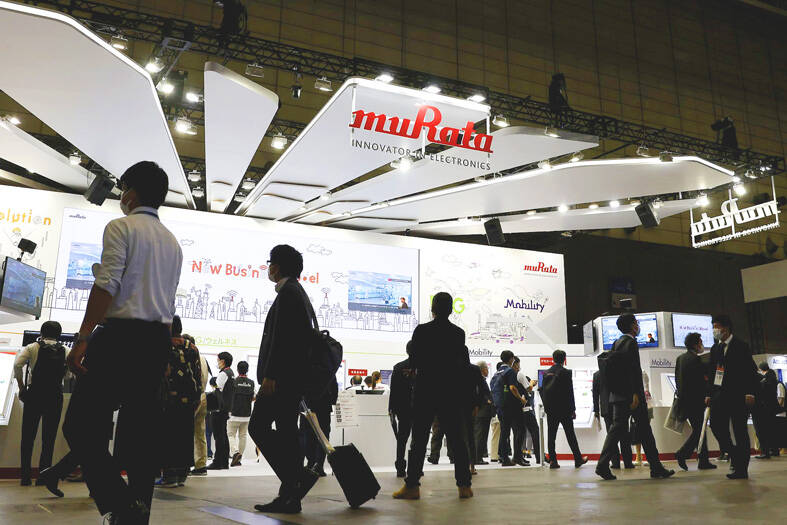Mobile industry bellwether Murata Manufacturing Co expects Apple Inc to reduce iPhone 14 production plans further in the coming months because of weak demand, which would force the supplier to again cut its outlook for its handset-component business.
“Judging by handset availability in stores, I see a downward revision happening,” Murata president Norio Nakajima said in an interview. “I hope that it won’t be too deep.”
Apple has trimmed iPhone output on softening demand and might slash production further, Bloomberg reported last month.

Photo: Bloomberg
Nakajima did not identify Apple by name — a common practice for suppliers to the infamously secretive company. Yet Apple is his key US customer and he did not deny that his references were to the iPhone giant.
Murata has already cut its global smartphone production forecast for this fiscal year a few times. The company initially anticipated in April that handset makers would produce 1.37 billion units, a slight increase from 1.36 billion in the previous fiscal year.
It lowered its prediction to fewer than 1.2 billion in October, then 1.09 billion two weeks later — both because of weaker demand for lower-end phones in China.
Nakajima said the latest estimate is 1.08 billion, a slight downward revision because of slower sales of handsets by Chinese manufacturers.
“If our forecast was to fall further, that would be because of the US customer,” he said.
The Kyoto, Japan-based manufacturer is a linchpin of the smartphone industry, providing electronic modules and components for Apple’s iPhones, Samsung Electronics Co’s Android smartphones and China’s leading device makers.
The global smartphone market is set to keep deteriorating next quarter, even as some Chinese handset makers are planning to release new models during the period, Nakajima said.
The manufacturers are confident that the new phones would sell well, but Nakajima said he has his doubts as the incoming models do not have enough enticing new features.
The phone market would start recovering “at a gradual pace” in the fiscal year starting in April, he said.
Despite the recent weakness in China, the world’s second-largest economy would remain an important market for the electronics industry, Nakajima said.
Some of Murata’s customers are shifting their production to Vietnam, India and other Asian regions, but a complete pullout from China is unlikely, at least during the next five years or so, he said.
Nakajima is running a long-term project to build a production chain for Murata that operates completely in China, using local parts. The move is aimed at addressing a potential deterioration in US-China relations — such as Beijing mandating that all products sold in the country rely on local components.
Information security is a concern, and Murata is seeking to ensure that its proprietary know-how related to manufacturing technologies is not compromised, Nakajima said.
The company might make mature products such as multilayer ceramic capacitors in China, but would not move production of some newer components to the country, he said.
Murata makes 65 percent of its products in Japan.

Meta Platforms Inc offered US$100 million bonuses to OpenAI employees in an unsuccessful bid to poach the ChatGPT maker’s talent and strengthen its own generative artificial intelligence (AI) teams, OpenAI CEO Sam Altman has said. Facebook’s parent company — a competitor of OpenAI — also offered “giant” annual salaries exceeding US$100 million to OpenAI staffers, Altman said in an interview on the Uncapped with Jack Altman podcast released on Tuesday. “It is crazy,” Sam Altman told his brother Jack in the interview. “I’m really happy that at least so far none of our best people have decided to take them

BYPASSING CHINA TARIFFS: In the first five months of this year, Foxconn sent US$4.4bn of iPhones to the US from India, compared with US$3.7bn in the whole of last year Nearly all the iPhones exported by Foxconn Technology Group (富士康科技集團) from India went to the US between March and last month, customs data showed, far above last year’s average of 50 percent and a clear sign of Apple Inc’s efforts to bypass high US tariffs imposed on China. The numbers, being reported by Reuters for the first time, show that Apple has realigned its India exports to almost exclusively serve the US market, when previously the devices were more widely distributed to nations including the Netherlands and the Czech Republic. During March to last month, Foxconn, known as Hon Hai Precision Industry

PLANS: MSI is also planning to upgrade its service center in the Netherlands Micro-Star International Co (MSI, 微星) yesterday said it plans to set up a server assembly line at its Poland service center this year at the earliest. The computer and peripherals manufacturer expects that the new server assembly line would shorten transportation times in shipments to European countries, a company spokesperson told the Taipei Times by telephone. MSI manufactures motherboards, graphics cards, notebook computers, servers, optical storage devices and communication devices. The company operates plants in Taiwan and China, and runs a global network of service centers. The company is also considering upgrading its service center in the Netherlands into a

Taiwan’s property market is entering a freeze, with mortgage activity across the nation’s six largest cities plummeting in the first quarter, H&B Realty Co (住商不動產) said yesterday, citing mounting pressure on housing demand amid tighter lending rules and regulatory curbs. Mortgage applications in Taipei, New Taipei City, Taoyuan, Taichung, Tainan and Kaohsiung totaled 28,078 from January to March, a sharp 36.3 percent decline from 44,082 in the same period last year, the nation’s largest real-estate brokerage by franchise said, citing data from the Joint Credit Information Center (JCIC, 聯徵中心). “The simultaneous decline across all six cities reflects just how drastically the market